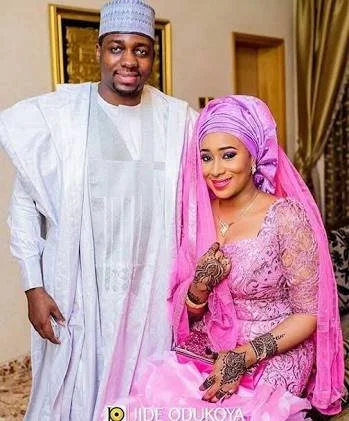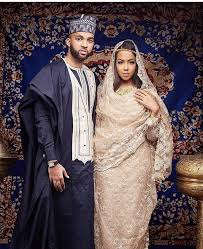MARRIAGE CELEEBRATION: How It Is Done In Hausa Land
I receive this invitation with great delight. Hive Cross Culture is a community where we can share our different kinds of cultures and traditions across the globe.
They have been organizing different kinds of contests to get to know more about one another, our diversity in languages and culture.
For this contest, they wanna know how different cultures perform their marriage rites or rituals, the process, and how the whole function is carried out.
I have had a personal experience of the Ibibio marriage rites, the Igbos, etc. And for this contest, I will be sharing The Hausa Marriage Rites
Hausa is one of the ethnic groups in Nigeria, the most populous and dominant group in northern Nigeria. The Hausa people are so strict with their marriage issues, such that a Hausa man and a woman are not supposed to be involved in any kind of sexual activities on or before their marriage. Unlike in most places which this isn’t really a problem so far there is an understanding between the couples and they both agree to whatever activity they wanna get involved in. Marriage is a hot topic for the Hausas and they get married at a very young age.
It is said and known that Marriage rites and requirements for the Hausa people are the simplest among all the ethnic groups in Nigeria. It is based on Islamic law otherwise known as the Sharia Law since the majority of the Hausa People are Muslim.
In the Hausa Tradition, the only thing the man provides is a house while the bride’s family will help furnish and set up the house for them. They so much believe and encourage making marriage rites less expensive for both families so as to prevent adultery in society.
MARRIAGE RITES FOR HAUSAS

First thing first, the man and the woman intending to get married will both agree before any other proper rites begin and on this note, there is no physical contact, not even a handshake. This is why I said earlier that they are a little too strict with their marriage practice.
Na Gani Ina So Stage
Na Gani Ina So is the Hausa way of saying, I have seen and I love it. In this stage, the groom-to-be family makes arrangements and visits the bride-to-be family for the purpose of making their intentions about marrying their daughter known.
They don’t go there empty hand-handed just like in other ethnic groups. They go there with gifts and food ranging from kolanut, fruits, calabash, etc. The bride’s family would then decide if they accept their proposal to give out their daughter for marriage. Accepting the gifts brought by the groom’s family is an indication that the marriage proposal made has been accepted.

Prior to this, both families must have made their own research to know and find out about the family and know If for sure they should carry on with the marriage process.
Courting Stage
This is when the intending couples are formally allowed to date and court each other so that they get to know each other. Though they are allowed to date and know each other, however a lot of restrictions are placed to avoid physical contact.
Normally in the Hausa Culture, it is a law that a man is not supposed or allowed to touch a woman except there are related and relatives don’t get married to each other that is why there are no restrictions between relatives.
The couple uses this period to get to know themselves better and if in the process of their courting relationship, they find out that they aren’t compatible then the marriage process is put to hold or better still terminated without any further process or activity but if they are both ok and compatible, the traditional marriage rites continue.
Gaisuwa And Sarana Stage
Gaisuwa in the Hausa language means greeting while Sarana means date fixing. Just as the name implies, in this stage, the date for the wedding ceremony is fixed alongside the bride's price.
The bride price is known as Sadaki in Hausa. The bride price of a Hausa bride is cheap, usually according to Islamic law. It has a minimum price which is usually a quarter kilogram of a gold piece (Rubu Dinar in Hausa).
However, the price could be higher depending on the wealth of the two families. After the price agreement is certain, the next stage is Sarana which is fixing a date for the wedding ceremony. At this stage, the man and woman can be said to be engaged. Still, no form of sexual contact.
And this stage is like a signal to other suitors and former friends of the bride. No other man comes for the woman again knowing that she is now engaged and to be married to someone else and all other friends of the bride back off.
Wedding Ceremony (Aure)
And this is the day that the bride and the groom are pronounced husband and wife. The wedding ceremony is known as Aure in Hausa and some people prefer to call it the wedding Fatiha.
On this day, the bride remains indoors with her friends and other older or elderly women. She is decorated with Lalle (Kunshi) which is known to other people as Hienna.
She is also made up and decorated with jewelry and this makes them even more beautiful.

But on the other hand, the groom remains outside on the ground. The Sadaki (bride price or dowry) is being paid and declared to the hearing of everybody that a particular man came to marry a woman in the family of this or that and the amount of dowry is also mentioned.
The bride’s family will accept the dowry and the Imam (Islamic Leader) will pronounce the couple husband and wife. And this marks the beginning of the union between the man (husband) and the woman (wife).

This is how the traditional marriage rites in Hausa land are performed or carried out. Though this isn’t the end of the wedding ceremony, it is not a must or a necessity but many other groups and cultures perform it and so does Hausa, and theirs is called Walimah which is known as the wedding reception.
Wedding Reception (Walimah)
The Hausa people call this stage Walimah which is the wedding reception where all the eating and drinking is done.
This is not the only purpose for this stage. In this stage, the married couples are being admonished and advised, after which they are prayed for.
And then families, relations and friends who came to celebrate with them would shower them with gifts and presents and then everyone departs after the last prayers are said for the married couples.
After everything has been said and done, in the evening, the bride’s friends would accompany her and other elderly women carrying all her belongings to her new home, her husband’s place, and also preferably, that night, the couple who now have the full right will finally come in contact with each other physically.
This is the Hausa’s Traditional Marriage System. The newly wedded bride is known as Amarya while the groom is known as Ango.
I so much appreciate @evegrace and @glotokens for the invite for this contest and I will love to invite @mahnoor1 to participate as well.
Thank you @selfhelp4trolls and @starstrings01 and the rest of the team for organizing this contest.
Here is the link to the content post if anyone is interested.
Beautiful
Wow!
Thanks
Wow, this is a great article. I really do not know much about this people but your post has enlightened me more about their process.
One of the things I love about this people and most times I was an hausa is the Lalle they use to decorate their hands and feet in their festive period. Mehn it is always lovely but I guess my belief won't permit me to do that on my wedding day as I would have loved to have them decorate my hands and feet with just that.
I am glad it has enlightened you.
Lol, anything is possible, just accept to weird for once, it's your life 😂
Well don't mind me, if it's not your culture then don't kill yourself, just keep admiring it from others.
Thanks for stopping by!
Dah Ikpa your post too long ni, my eye dey pain me sef🤗🤗🤗🤗🤗. But its nice, Hausa culture is also beautiful
😁 thank you
I loved the bride's dress and the henna tattoos, it is true, it makes her look much more beautiful. Is it true that this dye cannot be removed? Or if it can be washed? Thank you for share @zellypearl
No dear. The dye can be washed out after the marriage. But normally it's a kinda norm and it's their culture to have those things drawn on them.
Thank you for stopping by dear
Oh good, I had the idea that it could be washed. Thanks for answering my question.
I must say Hausa's marriage rites are pretty interesting. I have attended some, so I know. Sometimes the wedding celebrations could go on for days, if they are wealthy people. Nicely done ☺️